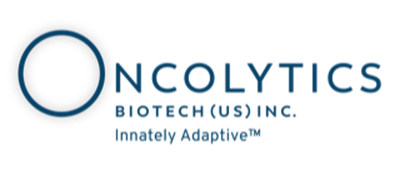Oncolytics Biotech® ASCO Abstracts Highlight Pelareorep's Potential in Pancreatic Cancer and Immunotherapeutic Mechanism of Action
Rhea-AI Summary
Oncolytics Biotech presented two abstracts at the 2024 ASCO Annual Meeting that highlight the potential of pelareorep in treating metastatic pancreatic ductal adenocarcinoma (PDAC) and its immunotherapeutic mechanism of action.
The first abstract discusses a new cohort in the GOBLET study, which will test pelareorep combined with mFOLFIRINOX, with and without atezolizumab. This cohort is funded by a $5 million grant, expecting enrollment to start this quarter.
The second abstract highlights pelareorep's ability to induce tumor-infiltrating lymphocytes (TILs) expansion, correlating with improved tumor response across multiple cancers, providing further support for its use as a backbone immunotherapy.
Positive
- Oncolytics secured a $5 million grant to fund the new GOBLET cohort for PDAC.
- Pelareorep showed improved tumor response rates nearly triple historical results in previous studies.
- Pelareorep demonstrated the ability to expand TILs, which is associated with better prognosis and treatment response.
- The trial design incorporates a robust Simon two-stage model to assess efficacy and safety.
Negative
- The success of the GOBLET cohort is uncertain until results are available.
- The addition of a PD-L1 inhibitor like avelumab reduced pelareorep's clinical activity, indicating potential limitations in combination therapies.
- Clinical trials are still in early stages; long-term efficacy and safety are yet to be established.
News Market Reaction 1 Alert
On the day this news was published, ONCY gained 2.83%, reflecting a moderate positive market reaction.
Data tracked by StockTitan Argus on the day of publication.
Trial-in-progress abstract highlights new cohort that could expand the company's pancreatic cancer program
Pelareorep's ability to expand TILs highlights its immunotherapeutic mechanism of action and potential as a backbone immunotherapy for multiple indications

"The two abstracts that we are sharing at ASCO this year are in synch with our mission of advancing pelareorep towards registrational trials. The first abstract outlines the design of a new GOBLET PDAC cohort that could significantly expand the potential of the company's pancreatic cancer program," said Dr. Matt Coffey, President and Chief Executive Officer of Oncolytics. "The chemotherapy regimens of mFOLFIRINOX and gemcitabine/nab-paclitaxel are the two most common standards of care in metastatic pancreatic cancer. We previously reported that the combination of pelareorep, gemcitabine, nab-paclitaxel, and atezolizumab yielded tumor response rates nearly triple historical results. Should the combination of pelareorep and mFOLFIRINOX produce a similarly positive outcome, an even broader range of metastatic PDAC patients may benefit from pelareorep-based therapy. This cohort is being funded by a
Thomas Heineman, MD, PhD, Chief Medical Officer of Oncolytics stated, "Pelareorep stimulates a proinflammatory response that primes tumors for immunologic killing and also activates both innate and adaptive immune responses. Our second ASCO abstract provides additional support for pelareorep's immunotherapeutic mechanism of action by describing its ability to stimulate the expansion of pre-existing and new TIL clones in the blood, which correlate with treatment response. These results build upon previously reported data from the AWARE-1 study in breast cancer to expand our understanding of pelareorep's immune-based mechanism of action, and it supports further investigation of TIL expansion as a potential biomarker of clinical activity in patients treated with pelareorep."
Details on the abstracts and poster presentation are shown below.
Title: Phase 1/2 randomized, open-label, multicenter, Simon two-stage study of pelareorep combined with modified FOLFIRINOX +/- atezolizumab in patients with metastatic pancreatic ductal adenocarcinoma.
Presentation Type: Poster
Abstract Number: TPS4203
Session Title: Gastrointestinal Cancer – Gastroesophageal, Pancreatic, and Hepatobiliary
Session Date and Time: June 1, 2024, 1:30 – 4:30 p.m. CT
A copy of the ASCO presentation will be available on the Media page of Oncolytics' website (LINK) following the conclusion of the meeting.
Highlights from the GOBLET cohort 5 abstract and poster include:
- The study utilizes a Simon two-stage design to evaluate patients with newly diagnosed metastatic PDAC.
- In Stage 1, 15 evaluable patients per arm will be randomized to receive either: 1) pelareorep + mFOLFIRINOX, or 2) pelareorep + mFOLFIRINOX + atezolizumab.
- The co-primary endpoints are objective response rate and safety. Secondary and exploratory endpoints include additional efficacy assessments (e.g., progression-free and overall survival), and biomarker evaluations.
- If Stage 1 success criteria are met, one or both treatment arms may be expanded to Stage 2, in which 17 additional evaluable patients per arm will be enrolled.
- Blood and tumor samples are being collected for translational evaluations.
Title: Pelareorep driven blood TIL expansion in patients with pancreatic, breast and colon cancer.
Presentation Type: Online abstract
Abstract Number: e14625
Highlights from the abstract include:
- The presence and expansion of TILs are associated with a better prognosis and response to treatment in cancer patients.
- Pelareorep treatment increased TIL expansion in the blood in all pancreatic, breast, and colorectal cancer patients evaluated after one cycle of treatment.
- Pre-existing TIL clonal expansion in the blood appears to correlate with tumor responses in pancreatic cancer patients.
- The addition of the PD-L1 inhibitor avelumab, unlike atezolizumab, eliminated pre-existing TIL expansion in the blood and reduced pelareorep's clinical activity.
- These data suggest that pelareorep offers a simple, reliable way to expand TILs to provide clinical benefit.
About GOBLET Cohort 5
The mFOLFIRINOX cohort of the Phase 1/2 GOBLET study is designed to evaluate newly diagnosed PDAC patients treated with pelareorep + mFOLFIRINOX with or without atezolizumab. There will be a three-patient safety run-in to evaluate the tolerability of each treatment arm: pelareorep + mFOLFIRINOX + atezolizumab and pelareorep + mFOLFIRINOX. A total of fifteen evaluable patients will be randomized to each arm in Stage 1 of this Simon two-stage study. The co-primary endpoints are objective response rate and safety. If Stage 1 success criteria are met, one or both treatment arms may be expanded to Stage 2, in which 17 additional evaluable patients per arm will be enrolled. Blood and tumor samples will also be collected for translational evaluations.
About GOBLET
The GOBLET (Gastrointestinal tumOrs exploring the treatment comBinations with the oncolytic reovirus peLarEorep and anTi-PD-L1) study is a phase 1/2 multiple indication study in advanced or metastatic gastrointestinal tumors. The study is being conducted at 12 centers in
- Pelareorep in combination with atezolizumab, gemcitabine, and nab-paclitaxel in 1st line advanced/metastatic pancreatic cancer patients;
- Pelareorep in combination with atezolizumab in 1st line MSI (microsatellite instability)-high metastatic colorectal cancer patients;
- Pelareorep in combination with atezolizumab and TAS-102 in 3rd line metastatic colorectal cancer patients;
- Pelareorep in combination with atezolizumab in 2nd line advanced and unresectable anal cancer patients; and
- Pelareorep in combination with mFOLFIRINOX with and without atezolizumab in newly diagnosed metastatic PDAC patients.
Any cohort meeting pre-specified efficacy criteria in Stage 1 may be advanced to Stage 2 and enroll additional patients.
About AIO
AIO-Studien-gGmbH (AIO) emerged from the study center of the medical oncology working group within the German Cancer Society (DKG). AIO operates with a non-profit purpose of promoting science and research with a focus on medical oncology. Since its foundation, AIO has become a successful sponsor and study management company and has established itself both nationally and internationally.
About Oncolytics Biotech Inc.
Oncolytics is a clinical-stage biotechnology company developing pelareorep, an intravenously delivered immunotherapeutic agent. Pelareorep has demonstrated promising results in two randomized Phase 2 studies in metastatic breast cancer and Phase 1 and 2 studies in pancreatic cancer. It acts by inducing anti-cancer immune responses and promotes an inflamed tumor phenotype -- turning "cold" tumors "hot" -- through innate and adaptive immune responses to treat a variety of cancers.
Pelareorep has demonstrated synergies with multiple approved oncology treatments. Oncolytics is currently conducting and planning combination clinical trials with pelareorep in solid and hematological malignancies as it advances towards registrational studies in metastatic breast cancer and pancreatic cancer, both of which have received Fast Track designation from the FDA. For further information, please visit: www.oncolyticsbiotech.com or follow the company on social media on LinkedIn and on X @oncolytics.
This press release contains forward-looking statements, within the meaning of Section 21E of the Securities Exchange Act of 1934, as amended and forward-looking information under applicable Canadian securities laws (such forward-looking statements and forward-looking information are collectively referred to herein as "forward-looking statements"). Forward-looking statements contained in this press release include statements regarding Oncolytics' belief as to the potential, mechanism of action and benefits of pelareorep as a cancer therapeutic; our stated mission of advancing pelareorep towards registrational trials; our belief that should the combination of pelareorep and mFOLFIRINOX produce a similarly positive outcome, an even broader range of metastatic PDAC patients may benefit from pelareorep-based therapy; our plans to advance towards registrational studies in metastatic breast cancer and pancreatic cancer; and other statements related to anticipated developments in Oncolytics' business and technologies. In any forward-looking statement in which Oncolytics expresses an expectation or belief as to future results, such expectations or beliefs are expressed in good faith and are believed to have a reasonable basis, but there can be no assurance that the statement or expectation or belief will be achieved. Such forward-looking statements involve known and unknown risks and uncertainties, which could cause Oncolytics' actual results to differ materially from those in the forward-looking statements. Such risks and uncertainties include, among others, the availability of funds and resources to pursue research and development projects, the efficacy of pelareorep as a cancer treatment, the success and timely completion of clinical studies and trials, Oncolytics' ability to successfully commercialize pelareorep, uncertainties related to the research and development of pharmaceuticals, uncertainties related to the regulatory process and general changes to the economic environment. We may incur expenses or delays relating to such events outside of our control, including public health crises such as pandemics and epidemics, which could have a material adverse impact on our business, operating results and financial condition. Investors should consult Oncolytics' quarterly and annual filings with the Canadian and
Company Contact | Investor Relations for Oncolytics | |
Jon Patton | Timothy McCarthy | |
Director of IR & Communication | LifeSci Advisors | |
+1-917-679-9282 | ||
Logo: https://mma.prnewswire.com/media/1762876/Oncolytics_Biotech_New_Logo.jpg
![]() View original content:https://www.prnewswire.com/news-releases/oncolytics-biotech-asco-abstracts-highlight-pelareoreps-potential-in-pancreatic-cancer-and-immunotherapeutic-mechanism-of-action-302154957.html
View original content:https://www.prnewswire.com/news-releases/oncolytics-biotech-asco-abstracts-highlight-pelareoreps-potential-in-pancreatic-cancer-and-immunotherapeutic-mechanism-of-action-302154957.html
SOURCE Oncolytics Biotech® Inc.







